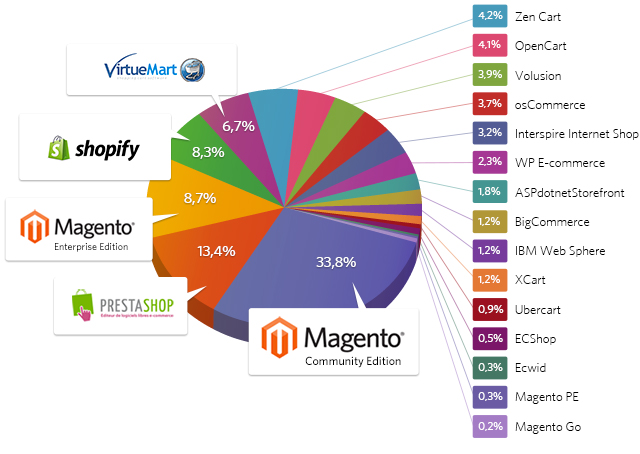When it comes to choosing the correct eCommerce platform you have quite a few options. However, if you are interested scaling your online store for the future, you don’t want to be fooled by imitators, popular names and those with just the better marketing efforts.
Shopify, Storenvy, Volusion, WooCommerce, and Big Cartel, are just a few that have made a name for themselves by offering inexpensive up-front cost, but don’t really provide the long term strategy that you will need to build a long term solution, which will equal a great brand.

Then there are enterprise level platforms that some of the top companies use, including, but not limited to fortune 500 companies, such as Oracle, Hybris and Demandware. Those platform usually require a heft buy-in and extensive team of developers and IT staff for deployment.
We Use Magento
We use Magento, and there are many reasons why. Magento is one of the most widely used eCommerce platforms in the business world, and is consider by many who have “been around” to be in the best-in-breed and best-in-class. The reason a lot of businesses as well as SideKart choose Magento is because it is a very robust platform with a high level of functionality and customizability. It is highly scalable, and little reason to change to a different platform later on as you scale up.
Who Uses Magento?
In fact 16% of the top 100,000 eCommerce websites are using Magento, 22% if we also include Magento Enterprise.
According to Google Trends the activity around Magento is still very high, since it’s official release in 2008.
What is Gartner
The Gartner Magic Quadrant is the go-to resource for an objective perspective on technology and service markets. It provides a graphical competitive positioning of four types of technology providers, in markets where growth is high and provider differentiation is distinct: leaders, challengers, visionaries, and niche players.
Gartner reports that “Digital commerce platforms enable organizations to build B2B, B2C or B2B-to-consumer (B2B2C) commerce sites and support a continuum of business objectives, from the generation of incremental revenue to the enabling of transformational business change,” notes Gartner, Inc. in Magic Quadrant for Digital Commerce, March 9, 2016. The report also predicts that by 2018, more than 50% of commerce sites will integrate technologies from more than 15 vendors to deliver a digital customer experience.


